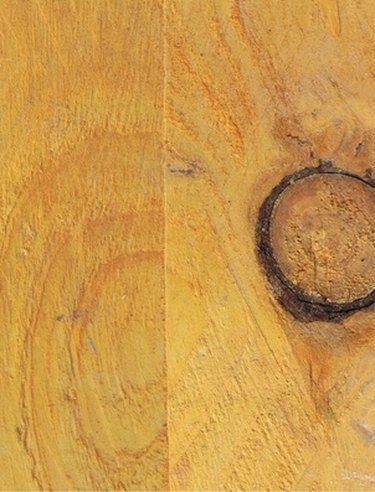Things You'll Need
Tape measure
1 inch plywood
2-by-4s
Chop saw
Skill saw
Steel L-brackets
Concrete board
Pencil
Paper
Screws
Power drill
Silicone caulk
Epoxy
Caulking gun
Paint brush
Respirator mask
Plastic pond lining

If you have decided to build a wooden water tank, for whatever purpose, then you will end up with a project that has the potential to look classy and elegant. It is important to remember that one gallon of water weighs 8.34 lbs. As the size of a wooden water tank increases, so does the amount of weight for the water, reaching up to nearly 8,000 lbs. for a tank that is 8 feet by 4 feet by 4 feet. As a result, there is a huge amount of stress put on the wooden beams, seams and seals for a wooden tank.
Step 1
Draw out a plan for your wooden water tank. Begin with a box of 1-inch thick plywood. Your plan should include inserting concrete board lining inside the plywood box and adding a layer of plastic lining on both sides of the concrete board. Also plan on using 2-by-4 or 2-by-8 ribs making bands that surround the wooden tank, spaced 3 to 4 inches apart. Ribs should also be connected using steel L-brackets.
Video of the Day
Step 2
Cut out and screw together the plywood box. You may need an assistant to hold the walls of the tank together while you screw in the brackets to join the pieces together. Cut and staple in the plastic lining. Cut and screw in the concrete board and add another layer of plastic lining, which will help provide easier cleaning and maintenance for the tank. Drill out holes for drainage at the bottom of the tank and a water intake near one of the top sides, according the intake and drainage systems that you plan on utilizing for your wooden water tank.
Step 3
Seal the seams of the concrete box with water proof epoxy. Be sure to wear your respirator mask while applying the marine grade epoxy.
Step 4
Construct the ribbed bands that will surround the tank. Lay the 2-by-4 or 2-by-8 pieces so that the 2-inch sides are facing the tank and secure them to the plywood using a powerdrill and screws. Use L-brackets to connect each corner of the band. Space the bands so that they are no more than 4 inches apart. If you want to design your tank with more reinforcement, or if you are using saltwater, you will need to space the bands closer together.
Step 5
Caulk all of the seals and apply a heavy-duty outdoor finish in order to help protect the wood. As you fill your tank, watch for signs of bowing and leakage through the cracks and seals of the plywood and bands.
Video of the Day